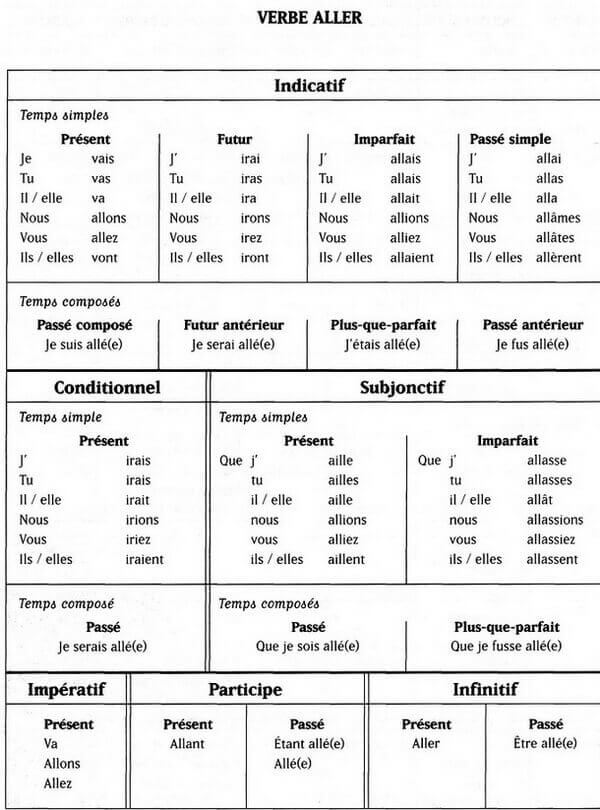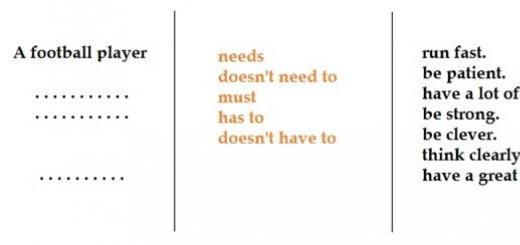The best place to start expanding your vocabulary in any language is with verbs. The fact is that verbs, like nothing else, help us in communication and, having learned them, it is easier to then learn other words.
The most frequently used verbs in French are avoir and ?tre, which are also auxiliaries in complex tenses. In addition to them, the most common ones also include faire, voir and aller. These words are not just the most frequently used individually, there are many stable expressions formed with their help.
?tre - to be
Tre mari?(-e)
?tre fatigu?(-e)
?tre au ciel
?tre pr?sent(-e)
?tre en retard
?tre occup?(-e) ? faire qch
Avoir - to have
avoir soif
avoir faim
avoir peur de...
avoir de la chance
avoir l"habitude de...
Faire - to do
Il fait du vent
faire ses examens
faire du sport
faire une promenade
faire du program
Aller - go
laisser aller
on all? trop loin
aller-retour
aller le nez lev?
This is just a small sample of all existing expressions with these verbs. In French, a major role in the meaning of a verb is played by its control (the preposition that follows it); depending on it, the translation can be either similar or completely different. Therefore, when studying this or that expression or phrase, you always need to pay attention to the preposition, otherwise you can say something stupid.

However, don't be afraid of a lot of expressions and controls, these things are very easy to remember. In addition, in the vast majority of cases, the verb denotes the same word or implies its use. But you noticed in the above examples that there are completely different meanings, as in combinations with aller (to go). Such diverse examples are specifically given here so that the radical difference in meanings even in constructions with the same words would be clear.
It is also necessary to be careful and constantly take into account the context, because completely identical expressions can be translated differently. For example, “y aller franco” can be translated as “ask directly” or as “act ahead.”
Other frequently used verbs:
| French | Russian |
|
adorer |
|
|
d?cider |
|
|
souvenir |
|
|
chercher |
|
|
tenir |
|
|
changer |
|
|
appeler |
call |
|
terminer |
end |
|
sortir |
go out |
|
?couter |
|
|
r?ver |
|
|
pleurer |
|
|
choice |
choose |
|
apprendre |
|
dire |
speak |
|
pr?venir |
warn |
|
jouer |
|
|
savoir |
|
|
trouver |
find |
|
arrive |
come |
|
rire |
laugh |
|
habiter |
|
|
boire |
|
|
refuser |
refuse |
|
farmer |
close |
|
mentir |
|
|
vivre |
|
|
rester |
stay |
|
demander |
|
|
ignorer |
|
|
remarker |
notice |
|
courier |
|
|
ouvrir |
open |
|
excuser |
excuse |
|
manger |
|
|
vouloir |
A verb is an independent part of speech that combines words denoting a state or action and answering the questions “What did you do?”, “What did you do?”, “What to do?”.
Verbs are central to French grammar. They have categories such as tense, mood, person, number, voice and aspect.
Verb tenses are divided into simple and compound, complex. Simple ones are formed without the help of auxiliary verbs, and complex ones are formed with the addition of the verbs aller, être, venir and avoir.
French verbs have moods such as the indicative indicatif, which contains eight tenses, the conditional conditionnel, which contains two tenses, the subjunctive subjonctif, which includes four tenses, and the imperative imperatif, which includes two tenses.
The indicative mood includes simple tenses: présent (present), past imparfait (imperfect) and passé simple (simple past), and futur simple (future simple), and complex: past passé composé (past composite), passé antérieur (earlier past) and plus-que- parfait (expresses an action performed before some other previously performed action), and the future futur antérieur (pre-future).
Conditional mood of French verbs includes the tenses conditionnel présent (present conditional mood) and conditionnel passé (past conditional mood).
The subjunctive mood includes such tense forms as simple présent du Subjunctif (present subjunctif) and imparfait du Subjonctif (past incomplete subjunctif), and complex passé du Subjonctif (past subjunctive) and plus-que-parfait du Subjonctif (expresses active in the subjunctive mood, committed before some other previously committed action).
The imperative mood has two tense forms: Impératif présent (present imperative) and Impératif passé (past imperative).
French verbs have first, second and third persons, singular and plural.
The voice forms of French verbs are: active voice Forme active, passive Forme passive and pronominal Forme pronominale.
By type, verbs are divided into the first, second and third groups, depending on their endings. Verbs of the third group are irregular verbs that change according to their own system. Some of them have typical endings for a certain subgroup and are conjugated according to a certain pattern. Since those used in creating compound tenses are conjugated according to an individual system, for the correct formation and conjugation of verbs in complex tenses, the conjugation of the verbs aller, être, venir and avoir must be known by heart.
There are several verbs in French that are distinguished by the presence of an additional pronoun. This is the pronoun "se", which agrees in number and gender with the subject. Such pronominal verbs are: replacing the passive voice, reflexive, reciprocal and pronominal. The conjugation of such verbs occurs according to general rules, but is abstracted from the pronoun. In complex tenses, pronominal verbs are conjugated only with the auxiliary être.
French Grammar - French Verbs
French verb forms
What is the secret to mastering French verbs? There is no big secret, but if you know the following subtleties, it will still be easier to learn them. By the way, in the article we will tell you how French children cope with verbs.
Translation from English of the article by Camille Chevalier-Karfis “The Secret To Mastering French Verb Conjugation” from the site frenchtoday.com
1. Difficulties of French grammar. What is the difference from conjugating English verbs
Present (present)
Take, verb “parler” (translated as “to talk”). Notice how it ends. In textbooks, endings are underlined, in bold or in red.
- Je parl e
- Tu parl es
- Il parl e
- Elle parl e
- On parl e
- Nous parl ons
- Vous parl ez
- Ils parl ent
- Elles parl ent
French Verb Conjugation - Present Tense
For an English-speaking student, for example, such a conjugation is unusual. In English you add"S"to the third person singular (he, she, it). Except for a few irregular verbs such asto be- to be, the verb will not change much:
- I speak, you speak, we speak, they speak... And further: he speaks, she speaks, it speaks
Looks simple compared to the French conjugation, doesn't it?
2. “Regular” French verbs
Verb "parler"is a “regular” verb. Such verbs are conjugated according to the above scheme.
Consider the verb"parler" more carefully:
- We remove "er"– the basis remains"parl".
Parler – er = parl
- To the stem we add the ending corresponding to the object pronoun.
Je= base + e = je parle
Tu= base + es = tu parles
Il, elle, on= base + e = il, elle, on parle
Nous= base + ons = nous parlons
Vous= base + ez = vous parlez
Ills, elles+ base + ent = ils, elles parlent
Students spend hours writing down these conjugations.
Grammar textbooks are crammed with them, in the present tense of the indicative mood and all other tenses and moods. The books promise that by practicing this way you will master verbs.
Let me disagree!

Conjugation of the verb “aller” - translation “to go”
3. Classification in French
French verbs are classified according tothree verb groups, the conjugation structure of which is “predetermined”.
- First group= French verbs ending in "ER".
- Second group= French verbs ending in "IR".
- Third group= French verbs ending in "RE".

So far it looks logical.
IN ADDITION, French has a lot of “irregular” verbs: verbs with a non-obvious conjugation model and others.
The first group, the "ER" group, includes only one irregular verb: one that ends in "er" BUT does not follow the same conjugation pattern as the verb "parler".
The verb conjugation pattern is noteworthy"aller", which is ALSO very useful in French. Although, it is not final, because there are also verbs ending in “ER”, which are incorrect judging by their endings, but change the basis when spelled. Such as"jetter". But I'm getting off topic.
So, the first group of French verbs with"ER"at the end - solid. Many useful verbs are conjugated using this model.
However, the other two “groups” have many exceptions.
Yes, verbs like "grossir" (to gain weight), “finir” (to finish, “choisir” (to choose) - regular verbs in"IR". But most verbs ending in "IR", incorrect. These are the verbs:"venir" (to come), "tenir" (hold), “dire” (speak). The list goes on for a long time.
So how does a French learner know which verb is"IR"is right or wrong?
When there are so many exceptions to a group, and these exceptions are such common verbs, is it still necessary to focus on this group?
Do you need to spend hours cramming these “IR” and “RE” charts, or is it better to use that time honing in on common irregular verbs? Decide for yourself.
4. The secret to conjugating French verbs
The secret is this: watch videos on YouTube, listen to French speech and you will learn the correct conjugation of verbs implicitly, without focusing on grammar.
Let's take the verb "parler"in the present tense.
Verb forms after"Je, tu, il, elle, on, ils, elles"pronounced exactly the same ="parl".Just like a base.
After "nous" pronounced “ons” How [ɔ] nasal = “parlons”, after "vous" pronounced [e] = "parlez", as well as the infinitive form of the verb "parler". So, say “parlez = parler = parl”.
French is a living language. People use it every day to communicate. It comes easier if you learn it not only from textbooks.
The same logic applies to French.Passé Composeupon agreement:
- Parler, parlez, parl, parle, parls, parles = "parl"
They are all pronounced the same.
Therefore, when you speak, you should not even think about making agreement in your speech. This is only important in writing.
First you must learn to speak French. Find an audio or video of a verb or other word being spoken by a native speaker. Listen several times. Now say the verb loudly and as closely as possible to the way a native speaker pronounces the word. This is what children do in France - they learn the language by ear.
5. The rudest and most common mistakes in French verbs
If more attention was paid to the pronunciation of French verbs, I would not hear many students pronouncesilent "ENT" after ils/ellesin French verbs.
This is the most popular mistake. You can’t imagine how many advanced French students are literally “killed” by verbs.
And don't even get me started ontying and silent endings. Did you know that"S" V "nous" And "vous" never pronounced as “S”? Never, absolutely never say them!
This ending is either not pronounced or pronounced like"Z"when tying. It would be easier if you remembered this:
- Nous = noo
- Vous = voo
And we would learn right now the French verbs that requireelisionand would pronounce them correctly.
6. Method of teaching French without audio materials
Learning French without audio materials is a crime given modern technologies and capabilities.
Everyone studying French independently or in a class must haveBescherelles or other tutorialsto check how verbs are written. If you plan to write in French, you will need a book like this. They are used by schoolchildren in France.
7. The key to successfully learning French is to prioritize
I'm not saying that all other teaching methods are bad. But approaches to learning are quickly becoming outdated. French is not taught to foreigners in the same way. There is a difference. French baby knows how to speak before she can write!
A five-year-old child would be surprised to find thatform "tu" usually requires "s". This is new to him/her.
Our adult mind works differently than a child's. Knowing grammar can and will help you master the French language.
- If you are learning French for communication: watch videos (from simple cartoons to serious films), listen to the radio and do not torment yourself too much with grammar.
- If you are learning a language to pass written exams: study the grammar, read books together with audio material and understand the logic of the teaching methods you use.
To hone French verbs, for example, you should:
- Understand how verbs are pronounced, before teaching them.
- Practice (with audio)with the most useful and commonly used verbs (both regular and irregular).
- Learn a verb together with a pronoun. They should flow naturally from your mouth with the correct clipping, binding or constriction.
- Teach out of order.Another stupidity from traditional teaching methods: schools force cramming from"je" to "ils". Your brain prioritizes conjugating verbs this way, and then you're surprised that you can't remember which form comes after"ils".
- Memorize negative forms well, so that you don’t have to “add” negative particles every time, and they will quickly pop up in your head. The same goes for inversion or questioning.
- Know when to use French tenses and moods. A beginner does not need to learn the French subjunctive mood. This shouldn't be his priority yet. Stay in the present indicative tense for now = this is the most commonly used tense (it can even accidentally play the role of a subjunctive since they often have the same verb form)!
8. How the French know which verb to use
If you think that all French people understand French conjugation and know when to use the subjunctive mood, you are far mistaken.
Yes, we learned this at school. But that was a long time ago. And we didn't necessarily pay attention to it (although French grammar and conjugation is a huge part of the French school curriculum, a much larger part compared to English grammar in English-speaking countries).
Instead we rely on our French flair. That's why we can speak a language because we can write it correctly.
For example, if I write:
Il faut que tu aies du courage = You will need courage.
I am very tempted to write“il faut que tu es du courage”. Cause? Because"tu es" widely used, and sounds just like"tu aies". Of course, this is not the same mood (indicative subjunctive - subjunctive). It's not even the same verb! (etre vs. avoir), but so strong is the habit of writing "tu es" that it is actually a very common mistake.
So how do I know it's the subjunctive mood? I would take the verb as an incorrect French subjunctive:
Il faut que tu saches... for example.
Even if the rest of the sentence doesn't work with"savoir", Then "il faut que"requires the subjunctive mood, that's enough.
Have fun learning French, and remember, repetition is the key!
Features of verb conjugation often become the main problem when learning French. Fortunately, the basic rules differ little from the Russian language: you need to modify the verb (run, talk) in accordance with the subject (I, she, you, we) and the tense used (past, present, future). There are 16 tenses in French, but the most commonly used are only 5, which are sufficient in most situations.
Steps
Basic rules
- Je: I;
- Tu: You;
- Ill, elle, on: he, she, it;
- Nous: We;
- Vous: you (plural or formal address);
- Ils, elles: they (masculine), they (feminine).
-
Infinitive forms of verbs. The indefinite form of a verb is called an "infinitive". Thus, in Russian, indefinite forms of verbs have the endings “-т” (to do) or “-ch” (to bake). In French, the infinitive also consists of one word and has one of three endings - "aller" (to walk), "ouvrir" (to open) and "répondre" (to answer). The infinitive is a stem that changes when conjugated.
- For example, in Russian you cannot say “He work”, you should say “he works". This is how the verb “to work” is conjugated.
-
There are three types of "regular" verbs. In French, most verbs fall into one of three categories according to their infinitive ending. Each category has its own conjugation rules.
- Verbs starting with -er: these include verbs like "parler" (to speak) and "manger" (to eat).
- Verbs starting with -ir: these include verbs like "applaudir" (to clap) and "finir" (to finish).
- Verbs starting with -re: these include verbs like "entendre" (to hear).
-
Remember irregular verbs. Unfortunately, some French verbs are conjugated in a special way. In almost every tense, such verbs have special forms, so they will have to be memorized separately. The following is a partial list that includes the most commonly used irregular verbs:
Conjugate "avoir" in the present tense to form "passé composé"."Passé compose" is compound time in the sense that the grammatical form consists of two parts. The first part is the conjugated verb "avoir" (to have). This construction is similar to the English language using the verb "have" in the present perfect tense: "I have eaten" (I ate) or "She has run" (she ran). This is the first part of the construction. Look again at how to conjugate the verb "avoir":
- Avoir (to have): J"ai, tu as, il a, nous avons, vous avez, elles ont.
-
Find out the "past participle" of the verb. Remember the example from the English language “I have eaten” (I ate). In this case, the form "eaten" is the past participle of the verb "to eat". It’s the same in French - in the past tense, a special ending must be added to the verb. These endings are easy to remember:
- Verbs starting with -Er, "-é". Examples: parlé, montré, decidé.
- Verbs starting with -Ir, "-i". Examples: fini, réussi.
- Verbs starting with -Re, "-u". Examples: entendu, répondu.
-
Form the past tense from two parts. Simply add the past participle of the desired verb to the appropriate form of "avoir". Although literal phrases are always translated as “I spoke” or “they listened,” this tense can also be translated as “I spoke” or “they listened.” Consider a few examples:
- first person singular: "ai + verb". J"ai parlé → I spoke;
- second person singular: "as + verb". Tu as fini → you're done;
- third person singular: "a + verb". Il a entendu → he heard;
- first person plural: "avons + verb". Nous avons réussi → we have succeeded;
- second person plural: "avez + verb". Vous avez essayé → you tried;
- third person plural: "-ont + verb". Elles ont répondu → they answered.
-
For some verbs you need to conjugate "être" instead of "avoir". The formula "avoir + past participle" works for 95% of French verbs, but in some cases you need to use "être (to be) + past participle" to get the past tense. Such constructions are translated into the past tense (“I fell”). List of verbs:
Replace "avoir" with "être" for the above verbs. Remember the list of intransitive verbs that also use the past participle. Please note that the verb must match the subject. For plurals, add an "-s", and for feminine genders, add another "-e".
- first person singular: "suis + verb". Je suis tombée → I fell;
- second person singular: "es + verb". Tu es tombé → you fell;
- third person singular: "est + verb". Il est tombé → he fell;
- first person plural: "sommes + verb". Nous sommes tombés → we fell;
- second person plural: "etes + verb". Vous êtes tombés → you fell;
- third person plural: "sont + verb". Elles sont tombées → they fell.
When conjugated, the verb changes depending on the person and number of the subject. The same thing happens in Russian. For example, you should say “I am reading”, but for the third person you need to change the ending to “et” - “ He chita no". In French, verbs are conjugated in the same way. Each pronoun (I, you, he, she, it, we, you, they) has its own verb form.
Remember French pronouns. French has one more pronoun than Russian, but they are still easy to remember:
Imparfait (past incomplete tense)
-
The past incomplete tense describes events that happened over a long period of time. It's actually quite simple. Use this tense for actions that happened in the past, but not at a specific time. For example, “When I was 10 years old, I played hide and seek” or “We bought Chinese food every week.” Such phrases could refer to one of the many times you played hide and seek, or to your habit of ordering Chinese food.
-
Find the "stem" of the verbs by eliminating the ending "-ons" of the first person plural present tense. The same applies to irregular verbs. First, get rid of the "-ons" ending. In Russian, everything is exactly the same: for example, the basis of the verb “to work” is “rabota” (I work, works, worked). Consider examples:
- parler:parlons → "parl";
- finir: finissons → "finniss";
- entendre: entendons → "entend";
- avoir:avons → "av";
- faire: faisons → "fais".
- The only exception is the verb "être", since the first person plural form ("nous sommes") does not have the ending "ons". The stem of the verb "être" is "ét".
-
Add unfinished time endings to the stem. Unlike "passé composé", "imparfait" consists of one word. Just add the desired ending to the base "-ais, -ais, -ait, -ions, -iez, -aient". As an example, consider the verb "regarder" (to look):
- first person singular: "-ais". Je regardais → I watched;
- second person singular: "-ais". Tu regardais → you looked;
- third person singular: "-ait". Il regardait → he looked;
- first person plural: "-ions". Nous regardions → we looked;
- second person plural: "-iez". Vous regardiez → you watched;
- third person plural: "-aient". Elles regardaient → they looked.
Futur (future tense)
-
The near future is formed using the formula "aller + verb infinitive". This simple formula literally translates to "going to do" and is similar to its usage in English. For example, the near future is used in sentences like “I'm going to run,” “She's going to eat,” and “They're going to study,” or in almost any sentence if the action happens soon enough. You need to use the appropriate form of the verb "aller" in the present tense and add the verb in the indefinite form. Let's consider the near future tense using the example of the verb "nager" (swim):
- first person singular: "vais + verb". Je vais nager → I'm going to swim;
- second person singular: "vas + verb". Tu vas nager → are you going to swim;
- third person singular: "va + verb". Il va nager → he is going to swim;
- first person plural: "allons + verb". Nous allons nager → we are going to swim;
- second person plural: "allez + verb". Vous allez nager → you are going to swim;
- third person plural: "vont + verb". Elles vont nager → they are going to swim.
-
Add future tense endings to the infinitive to make future tense. Remember that an infinitive is the indefinite form of a verb like "parler," "finir" or "entendre." Basis for the future tense Always ends in "r", so you should drop the "e" in verbs like "entendre". For each verb in the future tense, only one set of endings is used: "-ai, -as, -a, -ons, -ez, -ont". Let's look at the future tense using the example of the verb "nager" (swim):
- first person singular: "-ai". Je nagerai → I will swim;
- second person singular: "-as". Tu nageras → you will swim;
- third person singular: "-a". Il nagera → he will float;
- first person plural: "-ons". Nous nagerons → we will swim;
- second person plural: "-ez". Vous nagerez → you will float;
- third person plural: "-ont". Elles nageront → they will float.
If you want to learn French there are many different ways. You can go to a French speaking country and work there, you can take French classes or you use the bab.la French verb conjugation tool! The bab.la French verb conjugation is a super easy way to get to know the French verb conjugation and to practice your French verb conjugation skills. To practice your French verb conjugation skills is very important when you really want to know French by heart. The French grammar is really tricky sometimes - especially the French verb conjugation! It is important to repeat the French verb conjugation almost every day to get great results. One way to practice French verb conjugation is, as said, the use of the French verb conjugation tool. With the French verb conjugation tool you can search for French verb conjugation by letter, meaning that you can you start with learning all the French verb conjugation beginning with the letter A, then B and so on. If you are looking for a welcome change you can also use the bab.la French verb conjugation games and quizzes. In the sector bab.la Quizzes you will find a lot of quizzes and you can focus on the grammar category to practice French verb conjugation. When you want something more playful you can go to the bab.la Games. There you will find games like Hangman or Memorize. These games allow you to practice French verb conjugation in a really funny way. Start practicing French verb conjugation now!










